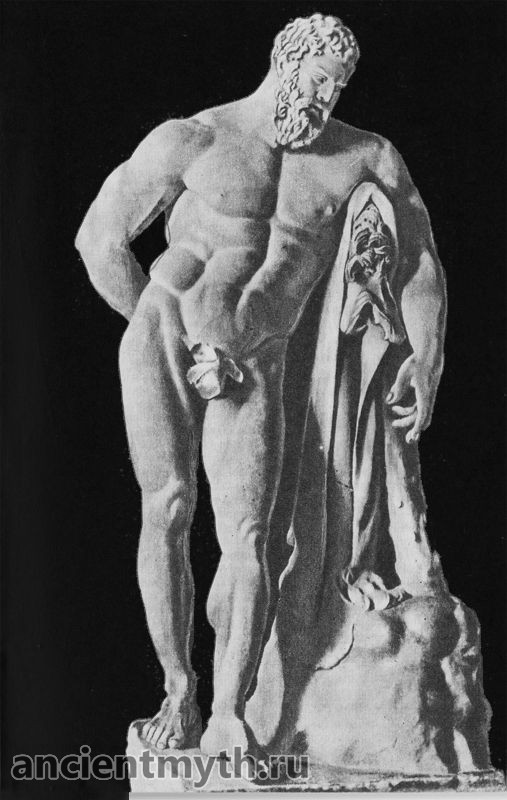Hercules and Eurytus
On the island of Euboea, in the city of Oichalia, the king ruled Evrit. The fame of Eurytus, as the most skilled archer, went far throughout Greece. The archer himself Apollo was his teacher, even gave him a bow and arrows. Once, in his youth, he studied archery with Eurytus and Hercules. It was this king who announced throughout Greece that he would give his beautiful daughter Iola as a wife to the hero who will defeat him in the archery competition. Hercules, who had just finished his service with Eurystheus, went to Oichalia, where many heroes of Greece gathered, and took part in the competition. Hercules easily defeated King Eurytus and demanded that he give his daughter Iola to him in marriage. Eurytus did not fulfill his promise. Forgetting the sacred custom of hospitality, he began to mock the great hero. He said he would not give his daughter to someone who was a slave Eurystheia. Finally, Eurytus and his haughty sons drove Hercules, who had become intoxicated during the feast, out of the palace and even out of Oichalia. Hercules left Oichalia. Full of deep sadness, he left Euboea, as the great hero fell in love with the beautiful Iola. Holding a grudge in his heart against Eurytus who insulted him, he returned to Tiryns.

(Statue of Helikon from Athens, II century BC)
After a while, the most cunning of the Greeks stole the herd from Eurytus Autolycus, son of Hermes. Eurytus blamed Hercules for this beauty. The king of Oikhalia thought that the hero had stolen his herds, wanting to avenge an insult. Only Ifit, the eldest son of Eurytus, did not want to believe that the great Hercules could steal his father's flocks. Ifit even volunteered to find the herds, just to prove the innocence of Hercules, with whom he was bound by the closest friendship. During the search, Ifit came to Tiryns. Hercules welcomed his friend cordially. One day, when the two of them were standing on the high walls of the fortress of Tiryns, built on a high rock, Hercules was suddenly seized by a violent anger sent upon him by the great goddess Hero. Hercules remembered in anger the insult that Eurytus and his sons had inflicted on him; unable to control himself anymore, he grabbed Iphitus and threw him off the fortress wall. The unfortunate Ifit crashed to death. By this murder, committed against his will, Hercules angered Zeus, since he violated the sacred custom of hospitality and the sanctity of the bonds of friendship, As punishment, the great thunderer sent a serious illness on his son.
Hercules suffered for a long time, finally, exhausted by the disease, he went to Delphi to ask Apollo how to get rid of this punishment of the gods. But the oracle Pythia did not give him an answer. She even banished Hercules from the temple as having defiled himself by murder. Enraged by this, Hercules stole a tripod from the temple, from which the pythia gave prophecies. This angered Apollo. The golden-haired god appeared to Hercules and demanded the return of the tripod from him, but Hercules refused him. A fierce struggle ensued between the sons of Zeus - the immortal god Apollo and the mortal - the greatest of heroes Hercules. Zeus did not want Hercules to die. He threw his brilliant lightning bolt from Olympus between his sons and, having separated them, stopped the fight. The brothers reconciled. Then the pythia gave this answer to Hercules:- You will receive healing only when you are sold into slavery for three years. Give the money earned for you to Eurytus as a ransom for his son Iphitus, whom you killed.
Hercules had to lose his freedom again. He was given into slavery to Queen Lydia, daughter of Iardan, Omfala. Himself Hermes took the money earned for Hercules to Eurytus. But the proud king of Oichalia did not accept them, he remained as before the enemy of Hercules.